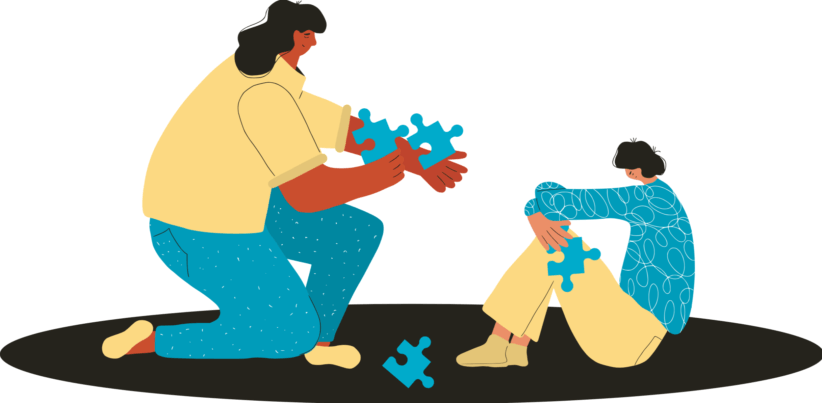
OPWDD Service And How It May Help Your Child with Special Needs
First, know in this special need journey with your child — there is help and hope.
Carrie Paden watched her 10-year-old daughter Isa mount onto the horse. Isa, who attends the Gillen Brewer School for Special Education on weekdays, had a big smile on her face as the horse started to slowly trot along the path. Isa bounced up and down and looked all over— first at the horse, then straight ahead at the path, then up towards the sky. NYC is a gem, but it just simply does not offer the exquisite farmland in Nyack that her daughter visited every Sunday for horseback riding lessons– the open, blue sky, the farm animals roaming around, the old, deeply-rooted trees boasting beautiful leaves, and Isa, glowing and waving from her perched spot on a horse. And thanks to financial assistance from OPWDD– the Office of People with Developmental Disabilities– Isa gets to mount that horse every single week with confidence.
What is OPWDD
OPWDD helps coordinate services for New Yorkers with special needs, like Isa who has intellectual and physical developmental delays. Raising kids with special needs can be challenging, so we’re always on the lookout for resources that can help our NYC parents. We know of OPWDD because there are moms on staff here at NYF who are parents of kids with severe special needs. We wanted to share more here so that NYC families can learn about how OPWDD may be helpful for their situation. Read on to find out about the services OPWDD offers, how to get involved, and how to best take advantage of the offices for your child.
How OPWDD works
One of the most important things to note is that OPWDD does not directly provide your family services. Rather, it provides services through a network of approximately 500 nonprofit service providing agencies. With this many nonprofit agencies, there are plenty of services available to you, depending on what your child needs. OPWDD is not based on financial circumstances, which means that no matter your family’s financial situation, you can benefit from OPWDD and the services they provide. We should also mention that OPWDD is most definitely not only for kids— it can help special needs adults transition into a community, provide assistance for families of special needs adults who choose to stay at home, and connect your family with clinical or therapeutic support. If you are curious to learn more about housing through OPWDD, check out (opwdd.ny.gov/types-services/housing) for the types of housing and to learn about the communities!
Now how do you even get started with OPWDD? The process is a bit lengthy with paperwork, evaluations, and info sessions, but the financial assistance you receive is worth it. “When I started, it was very interesting because I was literally at his huge table with a bunch of different parents- different journeys, ages, backgrounds- and I’m thinking, how come nobody knows about this? It’s literally money that the state gives you to help your child.” The problem is that OPWDD isn’t necessarily broadly advertised, which is why we’re giving you the scoop here! But it’s not every day that you see a detailed ad on Facebook or Instagram about the many benefits OPWDD offers. Why this is, we’re not exactly sure, but nonetheless, we’re letting you know now that if your child or someone in your family has special needs, you can receive additional financial support to help you along your journey. As most parents know, you have to be ready to fight for your child and their rights and this is a key part of their care now and for their future.
We’re sure you may be wondering: so how can I finesse horseback riding lessons for my little one? We know, it sounds amazing. In total transparency, we are sharing what we know. So, yes, unfortunately, it’s a little more complicated than it seems, which makes working with OPWDD tricky. Through self-direction, a program that OPWDD offers so that you can choose services for your kids, you’re required to hire a broker and a fiscal intermediary. “We started it, it dropped. We picked it up again, it dropped. You got to stick with it and be organized,” says Carrie. Basically, the broker helps you get the activities or services you want, and the fiscal intermediary pays the bills for those services.
But having to hire a broker and fiscal intermediary sounds intimidating. It all sounds like a lot– raising a kid with special needs requires constant attention, and add the task of hiring people to eventually secure services may not sound worth it. “With special needs families any experience you have with your kid is a good learning experience, and it’s meaningful to them. I see Isa on the horse, I see how brave she is– so much braver than I think I would be on the horse. Anytime there’s a smile on her face it’s worth it.” Carrie reminds special needs families considering OPWDD that although there may be some hoops and obstacles to get there, eventually when you do, you will be thankful that you put in those extra hours.
There are, of course, very specific rules for what you can spend the money on, but that’s where your broker comes in. They will help you make sure that the services you need “fit” within the OPWDD framework. For example, Carrie wanted to enroll Isa in a speech & language social group through Extreme Kids and Crew (extremekidsandcrew.org), a nonprofit that offers multiple activities such as swimming, arts & crafts, sports etc. But OPWDD has a sneaky rule that requires that any service you use is not only for kids with special needs. In other words, it needs to be open to all children, even if they specialize in special needs. “I prefer that anyways,” says Carrie, “I want Isa to be with typical kids too.”
But the description for the speech & language social group, though open to everyone, focused too heavily on special needs for it to qualify. After speaking with her broker, all Carrie had to do was get an ad rewritten that included keywords and removed ones that distinguished the social group as “therapy” just for special needs. There are plenty of other ways to work around the rules so that you can spend the money on what your child needs, and your broker will be there to help you through the process.
Psst..check out the 8 Podcasts for Kids: Both Fun and Education!
It is a lengthy process
OPWDD is a big agency, so it’s expected that there are going to be formal processes and structures in place that make it a bit difficult to get going. But know that you’ll have a support network in place along the way, including your broker and fiscal intermediary, other families working with OPWDD, and the nonprofits that you work with, who are typically more than willing to help you out with finessing any OPWDD rules if it means getting your child the support they need. We won’t sugarcoat it, it definitely takes a lot of work on your end as a parent, but many families have ultimately found OPWDD helpful.
Now, if you’re considering more long-term solutions for your adult child with special needs, there are a few things to know about OPWDD. First, like the services offered through self-direction, you will eventually receive financial assistance, but it takes a lot of effort. COVID-19 also continues to have an impact on group homes for adults for special needs, as staffing shortages have forced OPWDD to think about consolidating homes. This means that residents may be moved around against their wishes for the sake of having sufficient staffing. While we definitely understand the safety needs of having enough staffing and the way that the pandemic has impacted the workforce, many parents are frustrated, rightfully so, of the prospect of having their child abruptly moved to a new home. So if you’re looking to get involved with OPWDD right now, be mindful about the way that staffing may come into play.
Another frustration that we’ve heard from parents working with OPWDD for their adult children is that residents are being moved from out-of-state homes back to in-state ones before their 21st birthdays. It’s a “loophole in the law,” says Lynee Koufakis, mother of two boys ages 25 and 27 with ASD. Basically, parents have the right to “due process” after their kid turns 21 so that they can challenge OPWDD on where their child is placed. But before age 21 is up for grabs. So OPWDD was simply transferring residents, who were already used to their spaces and comfortable in their communities, back to New York if they were originally placed out-of-state. Sounds a bit crazy to you? Yep, we know. Some families actually came forward and expressed how this disrupted their adult children’s lives. For kids with special needs, constancy and routine is everything. Being suddenly uprooted to live somewhere else is definitely not beneficial for their progress.
OPWDD is an intricate organization. There are certainly challenges, whether you’re navigating agency services or living homes. But on the flip side, many families, like Carrie’s and Lynee’s, have found OPWDD helpful for raising kids with special needs in New York. Our best piece of advice is to explore how OPWDD may assist your family, but know that you are your child’s number one advocate. And remember that every journey when it comes to special needs is different. “My husband and I are still learning. There’s so much we need to know that we don’t know. We have not even utilized the whole budget,” explains Carrie.
To learn more about OPWDD and start the process to see if your child qualifies for OPWDD, first, you start with the Front Door process. Go to opwdd.ny.gov/get-started/front-door to get started.





















